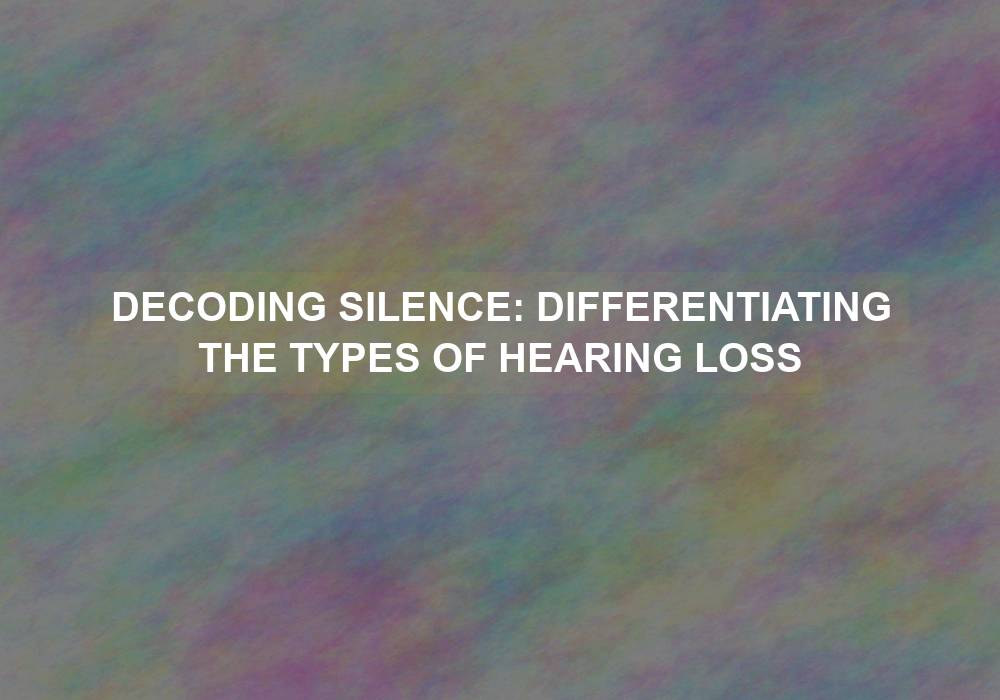Hearing loss is a common condition that affects millions of people worldwide. It can have a significant impact on an individual’s quality of life, communication abilities, and overall well-being. Understanding the different types of hearing loss is essential for accurate diagnosis and appropriate treatment. In this article, we will decode the various types of hearing loss, their causes, and available management options.
1. Conductive Hearing Loss
Conductive hearing loss occurs when sound waves cannot travel efficiently through the outer or middle ear. This type of hearing loss can be caused by several factors. Earwax buildup can block the ear canal and hinder the passage of sound waves. Middle ear infections can cause inflammation and fluid accumulation, which impairs sound conduction. Abnormal bone growth in the middle ear, known as otosclerosis, can also disrupt the transmission of sound. A perforated eardrum, resulting from trauma or infection, can lead to conductive hearing loss as well.
Symptoms of conductive hearing loss may include muffled or reduced sound perception, difficulty understanding speech, and a sensation of ear fullness. Treatment options for conductive hearing loss often depend on the underlying cause. If the issue is earwax buildup or a foreign object lodged in the ear, removal of the obstruction can restore normal hearing. Antibiotics or antifungal medications may be prescribed to manage middle ear infections. Surgical procedures, such as eardrum repair or bone growth correction, can be performed to address structural abnormalities. In some cases, hearing aids may be recommended as a temporary or permanent solution to amplify sound and improve hearing.
2. Sensorineural Hearing Loss
Sensorineural hearing loss is the most common type of hearing loss and occurs due to damage to the inner ear or the auditory nerve pathways leading to the brain. This damage can be caused by various factors. Aging, known as presbycusis, is a common cause of sensorineural hearing loss, as the delicate structures of the inner ear naturally deteriorate over time. Exposure to loud noises, such as prolonged or excessive noise exposure in occupational or recreational settings, can also contribute to this type of hearing loss. Genetic factors, certain medications, head trauma, and diseases like Meniere’s disease can all result in sensorineural hearing loss.
Symptoms of sensorineural hearing loss may include difficulty understanding speech, trouble hearing certain frequencies or pitches, tinnitus (ringing in the ears), and a feeling of imbalance. Unfortunately, sensorineural hearing loss is typically irreversible, as the damaged sensory cells in the inner ear cannot be regenerated. However, management options can help improve communication and quality of life. Hearing aids are commonly used to amplify sound and can be customized to an individual’s specific hearing needs. For individuals with severe to profound hearing loss, cochlear implants can be considered. These devices bypass damaged parts of the inner ear and directly stimulate the auditory nerve. Assistive listening devices, such as personal amplifiers or FM systems, can enhance sound clarity in specific listening situations. Additionally, learning communication strategies and lip-reading techniques can be valuable for individuals with sensorineural hearing loss.
3. Mixed Hearing Loss
Mixed hearing loss is a combination of both conductive and sensorineural hearing loss. It occurs when there are problems in both the outer or middle ear and the inner ear or auditory nerve pathways. The underlying causes of mixed hearing loss can vary, and treatment options may include a combination of those used for conductive and sensorineural hearing loss. It is important for individuals with mixed hearing loss to undergo a thorough evaluation by an audiologist to determine the appropriate management approach.
4. Central Hearing Loss
Central hearing loss is a less common type of hearing impairment that originates from problems in the central nervous system, specifically the auditory pathways within the brain. It can result from neurological conditions, head injuries, or illnesses affecting the brain’s auditory processing centers. Individuals with central hearing loss may experience difficulty understanding speech, even when sounds are loud enough. Treatment options for central hearing loss typically involve speech therapy, auditory rehabilitation, and strategies to optimize communication. Audiologists and hearing healthcare professionals can provide guidance and support for individuals with central hearing loss to improve their ability to comprehend speech and enhance their overall communication skills.
Conclusion
Hearing loss is a complex condition with various types and causes. Understanding the differences between conductive, sensorineural, mixed, and central hearing loss is crucial for accurate diagnosis and appropriate management. If you suspect hearing loss in yourself or a loved one, consult with an audiologist or hearing healthcare professional. They can perform a comprehensive evaluation and guide you towards the most suitable treatment options, including hearing aids, cochlear implants, assistive listening devices, and communication strategies. Remember, early intervention and timely management can significantly improve the quality of life for individuals with hearing loss.

